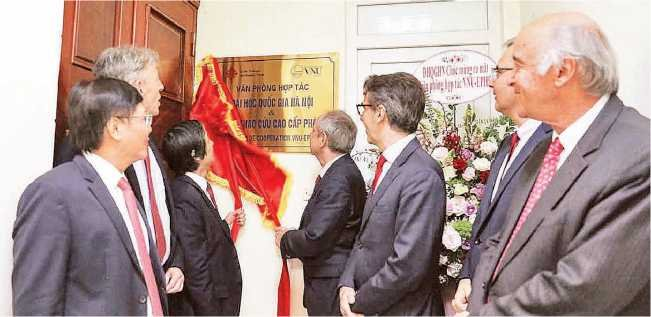Teaming up with the world to better understand Vietnam
More evidence of sovereignty
For years, Vietnam’s leading Han-Nom archive and research centre has effectively fulfilled the task of collecting relevant materials and has now entered the stage of digitising them.
The institute’s researchers were also meticulous in looking for and collecting ancient documents related to Vietnam at foreign archives centres. Dr Tran Trong Duong, a member of the institute’s scientific council, said that this approach is highly important because such centres hold valuable materials that Vietnam does not possess.
Dr Duong recalled in 2016, some researchers of the institute visited the Keio Institute of Oriental Classics - Shido Bunko - in Tokyo, Japan, and found a map entitled “Hoang Le Canh Hung Ban Do”, which contains important information about Vietnam’s Hoang Sa (Paracel) and Truong Sa (Spratly) archipelagos.
Since they were unable to buy back the original map, the Vietnamese researchers asked the Japanese side to provide them with a digitised version. The map illustrated the route from the capital Thang Long (present-day Hanoi) to the Champa Kingdom and was much more detailed than other maps.
The researchers then used scientific methods to compare the writings and illustration of the Hoang Le Canh Hung Ban Do with those in another map entitled “Thien Nam Tu Chi Lo Do Thu” as well as other ancient maps in order to learn about the name Yellow Sand or Hoang Sa.
This is a significant material, which, along with other materials, aids in the research on the history of the Hoang Sa Islands as well as the development of Vietnamese people occupying and exercising sovereignty over this archipelago.
Excellent achievements
In recent years, the institute has worked with other agencies to hold many international workshops, including one on the Vietnamese Confucian examination system (1075-1919) and its legacy, which was jointly held by the Vietnam Academy of Social Sciences (VASS), the Institute of History, the Institute of Han-Nom Studies and the Harvard-Yenching Institute of the United States.
The institute also sent delegations to attend international workshops on writings and woodblocks in Japan. A highlight in the institute’s international publication record was a series of articles by three of the institute’s researchers (Trinh Khac Manh, Nguyen Tuan Cuong and Tran Trong Duong) on ancient Vietnamese writings published in a SCOPUS journal.
Duong said “People often think that when doing research about Han-Nom, you have to work with ancient materials, so it is very difficult to publish internationally. But it’s quite to the contrary; international academia is very interested in this matter, especially in original materials. Other researchers of the institute have also published their research in English, in addition to Chinese, Japanese and French.”
Expectations on Vietnamica
The discussion would be incomplete without mentioning Vietnamica, a project on historical research and data processing of ancient Vietnamese inscriptions that is sponsored by the European Research Council (European Union). The project aims to study the history of donations made to village temples through inscriptions, to digitise materials about Vietnam stored in Europe and Vietnam, and to offer training on epigraphy.
The project was initiated by Professor Philippe Papin from the École Pratique des Hautes Études (EPHE), a French higher education institution. EPHE has been working with the Vietnam National University through the University of Social Sciences and Humanities and with the VASS through the Institute of Han-Nom Studies. At the launch of Vietnamica on November 4, 2019, Professor Nguyen Quang Thuan, a former VASS President, described it is an important event in the field of social sciences and humanities in Vietnam in 2019.

The launch of the Vietnamica project office at the Vietnam National University
According to Jean-Paul de Gaudemar, director of AUF, which is responsible for managing the project’s finances, the AUF will support the promotion of research results and achievements so that scientific values will be first disseminated to the AUF community, with the membership of nearly 1,000 universities and research institutes. The Institute of Han-Nom Studies expects that this inter-disciplinary project will digitise original historical data archived in Europe and Vietnam as well as inscriptions in Vietnam, helping to create a common database on Han-Nom culture for all domestic and foreign researchers.





